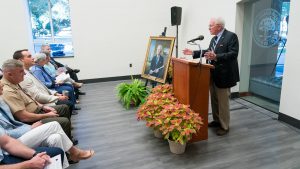
Scott native, veteran tapped to be Game and Fish director
Note: Austin Booth is a ’08 Citadel, Baker School of Business alumnus. Upon learning of his new position, the college asked him to send a brief reflection on the value of his Citadel education.
“I am humbled and thrilled to serve Arkansans and the Arkansas Game and Fish Commission as the next director.
Anyone who knows The Citadel, knows that it is built on foundations of service, perseverance, and selflessness. By these virtues, The Citadel–especially Bravo Beach–prepared me tremendously well to serve our nation in the Marine Corps and now in my home state.
I will always have a deep sense of gratitude for The Citadel’s commitment to growing leaders and citizens of character.”
Austin Booth, The Citadel Class of 2008, Director, Arkansas Game and Fish Commission
As seen in Northwest Arkansas Democrat Gazette, by Bryan Hendricks
LITTLE ROCK — The Arkansas Game and Fish Commission named Austin Booth as the agency’s 19th director Thursday, succeeding Director Pat Fitts, who will retire June 30.
Booth, 34, is a Scott native and most recently served as chief of staff and chief financial officer for the Arkansas Department of Veterans Affairs. His starting salary as the Game and Fish director will be about $138,000 annually.
As chief financial officer for the Department of Veterans Affairs, Booth managed a budget of nearly $36 million. His primary responsibilities included supervising the agency’s assistant directors in managing two veterans cemeteries and two veterans homes. Booth’s resume cites reversing a $1.2 million annual loss at one veterans home to an annual profit exceeding $400,000.
The Arkansas Game and Fish Commission’s annual budget is about $92 million.
Booth served as a captain in the Marine Corps in several capacities from 2011-19, including a 2015-16 deployment to Afghanistan. He said his military service made him appreciate the influence hunting and fishing exerts on the Arkansas character.
“The catalyst for me applying to be next director was, ironically, a lousy duck hunt,” Booth said.
He described a morning in a duck blind when a flock of mallards landed among decoys about one minute before legal shooting time.
“A young man, high school age, reached for his gun, but he hesitated because he knew what time it was,” Booth said. “His dad reached over, put his hand on the young man’s gun and said, ‘Son, have some self-respect.’
“I don’t know whether that young man reflected on what his dad told him, but I have,” Booth said. “Arkansans have a humble and quiet grit about them. The things we learn in the outdoors — perseverance, community, selflessness and managing disappointment — all things that contribute to a good hunt, are things I see in the people of our state. I draw a direct line from our appreciation for the outdoors to the cultural attributes of Arkansans. It sets us apart from every other state.
“That’s something I’m willing to fight for. I am thrilled, humbled and excited to lead the Arkansas Game and Fish Commission as director to ensure the national treasure in our backyard, that we leave it better than we found it not only for the current Arkansans, but for the future crop of outdoorsmen that follow in our footsteps.”
At least three members of the seven-person commission cited Booth’s leadership and relationship-building skills as his most valuable attributes.
Commissioner Stan Jones of Walnut Ridge said those skills are essential for repairing and strengthening ties with the Arkansas Legislature. The Game and Fish Commission’s relationship with the Legislature was strained in March and April when three bills to increase the agency’s funding failed to get out of committee.
In 2018-19, Booth served as a Marine Corps judge advocate. His resume describes the position as being responsible for “creating and maintaining effective relationships with members and staff of the U.S. Senate and U.S. House of Representatives Appropriations Committees for … procurement and research and development, a portfolio of more than $11 billion.” Booth also prepared and advised senior Marine and Navy leaders for “testimony and engagements” with House and Senate members and staff.
From 2016-18, Booth served as a defense fellow for U.S. Rep. Steve Womack, R-Ark. Booth’s resume says he advised Womack and his staff on national security policy. He also served as legislative assistant for the Military Construction and Veterans Affairs Appropriations subcommittee.
“This is a huge agency that is doing a tremendous amount of good for our state,” Booth said. “I want to understand the budget and the infrastructure needs to a degree where I can ensure as director that we can continue to do the good that we do in perpetuity.”
Booth said his lifelong dream was to serve in the Marine Corps and said he regretted going to law school instead of entering the Corps directly after college.
“At Catholic, I watched 9/11 happen on live TV,” Booth said. “The turning point for me was when I was gone from The Citadel, a ton of my buddies served in Iraq and Afghanistan. I realized I didn’t get along with lawyers very well. I should have gone straight in from college.”
Booth entered active duty in 2011 and served as a judge advocate trial counsel at Quantico, Va. A benefit to his duty station was being allowed to hunt and fish on the facility grounds. Some of the finest deer and turkey hunting on the East Coast was within 10 minutes of his home.
“The Marine Corps brought a diversity of people that I had never been around before and exposed me to a lot of people that never hunted or fished before,” Booth said. “I started teaching people how to hunt and fish. That highlighted for me how special our state is, and how unique people from Arkansas are.”
Upon returning to Arkansas in 2019, Booth said he was astonished at the high price of duck hunting leases. His alternative was dealing with the crowds on public hunting areas. He said that is an unacceptable choice that confronts all Arkansas duck hunters.
He said the key to attracting and retaining new hunters is to provide abundant access to high-quality hunting opportunities.
“As we try to breathe life into Arkansas’ outdoors, we have to do it in a way that does not disenfranchise our current outdoors people,” Booth said. “If we sell a million new hunting licenses next year, but there’s no place on public land for them to hunt, then we’ve shot ourselves in the foot. If we sell a million hunting licenses and don’t have the launching ramps or the water control infrastructure, and if we’re not managing all that in a way that can sustain it long term, then we’ve shot ourselves in the foot.
“We have to bring new blood into the sport and do it in way that keeps faith with existing Arkansas hunters and anglers.”
From 2015-16, Booth served as an operational law attorney, advising on the legality and strategic implications of dynamic, lethal targeting.
Booth acknowledged that with his experience, he could earn considerably more money as a lobbyist or a consultant. He said that serving as director of the Game and Fish Commission is a more natural fit for him.
“I left the state for a long time to serve my country, and I brought my family back because I believe it’s one of the best places in the country to raise your family,” Booth said. “I want to make my state a better place.
“When I look at the Arkansas Game and Fish Commission and the reach that it has, and the very real impact that it has on the left, the right, the well-to-do and those of modest means, I can’t think of a better way to serve for the better good of Arkansans than with the Arkansas Game and Fish Commission.”

 Two teams win the 11th annual Baker Business Bowl, a first for the event
Two teams win the 11th annual Baker Business Bowl, a first for the event “I’m cared for here as a student at The Citadel”: Meet Marine Corps veteran student Stuart Barickman
“I’m cared for here as a student at The Citadel”: Meet Marine Corps veteran student Stuart Barickman The Citadel unveils portrait of Col. Myron Harrington
The Citadel unveils portrait of Col. Myron Harrington


